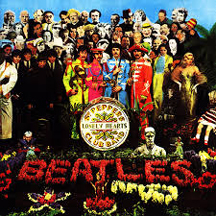Sgt. Pepper’s Lonely Hearts Club Band is the eighth studio album by the British rock band the Beatles. Released on 1 June 1967, it was an immediate commercial and critical success, spending 27 weeks at the top of the albums chart in the United Kingdom and 15 weeks at number one in the United States. It won four Grammy Awards in 1968, including Album of the Year, the first rock LP to receive this honor. Knowing they would not have to perform the tracks live, the band adopted an experimental approach to composition. In 2003 the Library of Congress placed Sgt. Pepper in the National Recording Registry, honouring the work as “culturally, historically, or aesthetically significant”. That same year Rolling Stone magazine ranked it number one in its list of the “500 Greatest Albums of All Time”. As of 2014, it has sold more than 30 million copies worldwide, making it one of the best-selling albums in history. (More from Wikipedia)
The next album by Les Sinners (though with the name shortened to just Sinners) for Jupiter, Vox Populi (Latin for “Voice of the People”) came out in 1968 and is among the crush of “concept albums” that followed in the wake of the Beatles’ 1967 masterpiece, Sgt. Pepper’s Lonely Hearts Club Band. The album has acquired legendary status among fans of Quebec’s musical scene. The album is entirely in French and is probably the first and certainly one of the best French Canadian concept albums ever released. A whole barrel of musical influences are present: the Beatles, the Monkees, the Byrds, the Who, Indian music, etc. The cover appears to show Jesus speaking in a snowy cemetery.
(April 2013)
* * *
The Beatles performed a sort of mini-Wall of Sound at the close of their masterful Sgt. Pepper’s Lonely Hearts Club Band album, not long after Phil Spector came along. Following the second symphonic build-up within “A Day in the Life”, the orchestra swelled into a crescendo, and then there was a thunderous piano chord (an E-major chord to be exact). Many people who have been around a piano marvel at how long the instrument can hold a note; and here, the Beatles were dealing that expectation up in spades with a long, slow fade for nearly one full minute before the sound faded into background hiss.
Actually though, it wasn’t just one piano: John Lennon, Paul McCartney, Ringo Starr, and one of the Beatles’ roadies, Mal Evans were manning different pianos; while George Martin was playing the same chord on a harmonium. What’s more, the gain was gradually turned up as the chord faded in order to prolong the effect – at the end (they tell me), it is possible to hear background sounds in the recording studio: rustling papers, a squeaking chair, and the air conditioners.
(October 2013)
* * *
To some extent, the psychedelic movement in rock was winding down when Cheap Thrills came out in August 1968, or at least it was old news: Sgt. Pepper’s Lonely Hearts Club Band had come out the year before, “the Summer of Love” in San Francisco was also in 1967, and Hair opened on Broadway in late 1967. There was even a mock funeral for “The Death of the Hippie” in San Francisco in October 1967.
(February 2014)
* * *
Allmusic states the musical and historical importance of Ptooff! well in their entry by Dave Thompson: “Talk today about Britain’s psychedelic psyxties, and it’s the light whimsy of Syd Barrett’s Pink Floyd, the gentle introspection of the Village Green Kinks, Sgt. Pepper, and ‘My White Bicycle’ [by Tomorrow] which hog the headlines. People have forgotten there was an underbelly as well, a seething mass of discontent and rancor which would eventually produce the likes of Hawkwind, the Pink Fairies, and the Edgar Broughton Band. . . .
“But the deranged psilocybic rewrite of ‘Gloria’ which opens the album, ‘I’m Coming Home’, still sets a frightening scene, a world in which Top 40 pop itself is horribly skewed, and the sound of the Deviants grinding out their misshapen R&B classics is the last sound you will hear. Move on to ‘Garbage’, and though the Deviants’ debt to both period [Frank] Zappa and [the] Fugs is unmistakable, still there’s a purity to the paranoia.
“Ptooff! was conceived at a time when there genuinely was a generation gap, and hippies were a legitimate target for any right-wing bully boy with a policeman’s hat and a truncheon. IT and Oz, the two underground magazines which did most to support the Deviants ([Mick] Farren wrote for both), were both publicly busted during the band’s lifespan, and that fear permeates this disc; fear, and vicious defiance.”
(March 2014/1)
* * *
Small Faces’ response to the Beatles’ Sgt. Pepper album was a remarkable psychedelic achievement called Ogdens’ Nut Gone Flake; the album was originally released in a round cover and had the appearance of a vintage tobacco tin. And I sure wish it would show up from the LP’s in the Katrina mud that I still haven’t cleaned up, because I miss it!
While the quotation about “more popular than Jesus” itself faded quickly – particularly after the band released their monumental Sgt. Pepper’s Lonely Hearts Club Band album the following year – its effects never really went away. Here is the chorus in the Beatles’ final #1 single, “The Ballad of John & Yoko” (and clearly John Lennon is addressing Jesus, not voicing an oath): “Christ, you know it ain’t easy / You know how hard it can be / The way things are going / They’re gonna crucify me.”
* * *
Following the Beatles’ last tour, and before recording on Sgt. Pepper began in 1967, George Harrison and his wife Pattie Boyd made a pilgrimage to Bombay, where he studied the sitar, met several gurus, and visited many holy places.
Also from Wikipedia: “[George] Harrison became a vegetarian in the late 1960s, and a devotee of the Indian mystic Paramahansa Yogananda, a guru who proselytised Kriya yoga, after he was given Yogananda’s Autobiography of a Yogi by Ravi Shankar. (Yogananda and three other major figures from Kriya yoga, Sri Mahavatar Babaji, Sri Yukteswar Giri, and Sri Lahiri Mahasaya appear on the cover of Sgt. Pepper’s Lonely Hearts Club Band.)”
(September 2014)
* * *
To some extent, Pet Sounds was Brian Wilson’s answer to the Beatles’ Rubber Soul album; and in turn, the Beatles’ Sgt. Pepper’s Lonely Hearts Club Band album is in response to Pet Sounds. Sgt. Pepper and Pet Sounds were voted #1 and #2, respectively, on the Rolling Stone’s list of the 500 Greatest Albums of All Time.
(October 2014)
* * *















